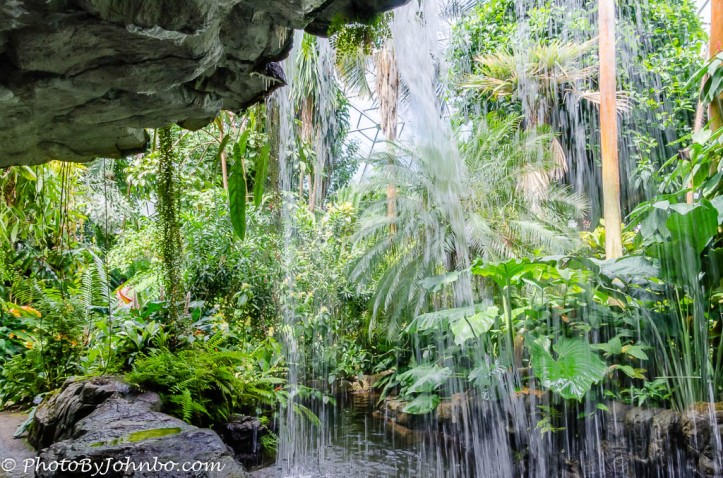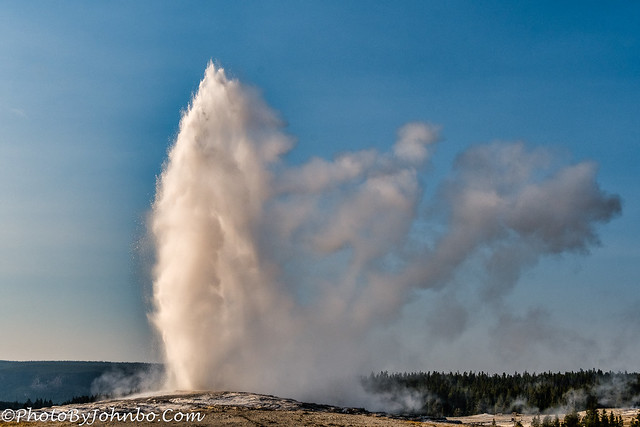
This week, Sofia focused on her challenge of moving water. She writes, “This week we’re looking for Water in Motion, gentle or powerful, man-made or natural, the choice is yours.” You can read her entire challenge post here. Taking a cue from her quote, I’ve decided to break my response into three sections. My first three images feature manmade water features.
The opening image features one of the waterfalls in the Climatron at the Missouri Botanical Garden. The Climatron is a geodesic dome greenhouse that houses a recreated tropical rainforest environment. Part of the path through the dome leads behind this waterfall, offering some creative abstract photo opportunities.
One of my favorite water features is at the Heard Museum in Phoenix. The museum is a leading center for Native American art preservation and exploration. In the museum courtyard, this water feature’s design complements the Spanish Colonial architecture of the buildings.
The Sunken Garden was a Works Progress Administration Project during the Great Depression to provide jobs for unemployed men. The land it occupies was previously a neighborhood dumpsite transformed by the families who donated the location for the project. Rocks were used extensively to create terraced retaining walls, waterfalls, and water fountains. This pair of waterfalls are adjacent to two stairways leading into the lower levels of the garden.
This section features the power of moving water. Hell’s Canyon, straddling the borders of Idaho and Oregon, is renowned for its dramatic scenery and wild whitewater rafting adventures. The Snake River, which carves through this canyon, boasts numerous rapids. While many visitors choose rafts to travel through some of the more powerful rapids, my wife and I decided to go on a jetboat excursion that traveled through far less energetic canyon sections.
I would be remiss in not including at least one view featuring the power of our mighty oceans. The Cape Perpetua Scenic Area comprises the Cape Perpetua Marine Reserve, Oregon’s largest marine reserve. A nearby attraction is the Heceta Head State Scenic Viewpoint, a stunning viewpoint offering dramatic Oregon Coastal scenery. As I watched the waves crash against the coastline, I pondered how many millennia the relentless wind and waves from the Pacific Ocean have shaped the Oregon coast.
The Old Faithful Geyser is probably the most famous attraction in Wyoming’s Yellowstone Park. The predictability of Old Faithful’s eruptions makes it a popular attraction for visitors to Yellowstone National Park. The geyser’s eruptions are caused by the heating of underground water by molten rock (magma) deep within the Earth. The heated water expands and rises, eventually reaching the surface and erupting as a geyser. While eruptions can vary from 44 minutes to two hours, Old Faithful erupts every 90 minutes on average. Each eruption lasts 90 seconds to 5 minutes and releases 3,700 to 8,400 US gallons (14,000 to 32,000 liters) of boiling water.
The third section of images features some of the waterfalls I’ve had the opportunity to capture. Near Ironwood, in Michigan’s Upper Peninsula, Potawatomi Falls tumbles over moss-covered rocks into a large pool below, surrounded by lush vegetation. One of the most accessible waterfalls along the Black River Scenic Byway, the falls viewing platform is just a short walk from the parking area. This photo is over 25 years old, scanned from a 4×6 color print, and was taken in the late 1990s, but the story of how and why I went to the Upper Peninsula is for another day.
While not a cascading giant, Sunbeam Falls holds a certain charm. The waterfall consists of multiple drops with a total height of around 75 feet (23 m.) The cascading water flows over moss-covered rocks, creating a veil-like effect, especially in the summer when the water flow is reduced. Best of all, it’s but a short walk from the parking area.
On our trip through Glacier National Park in 2020, we traveled the Going to the Sun Road. At one of the scenic stops, I captured this view of a waterfall on what I think is McDonald Creek. It is not McDonald Falls, as it doesn’t match any of the images of that waterfall I could find on an image search. I found a few photos on the Internet that feature an image at this exact viewpoint, but none of the images reference the waterfall’s name. If you know, please leave a comment.
Probably the most magnificent series of waterfalls I’ve had the pleasure to photograph is the three waterfalls that comprise Niagara Falls on the Niagara River. Of the three waterfalls, Horseshoe Falls is the most stunning. Also known as the Canadian Falls, it is the largest of the three waterfalls that straddle the international border between Ontario, Canada, and New York, USA. Horseshoe Falls boasts a majestic width of 2,670 feet (813 m) and a height of 188 feet (57 m). It accounts for about 90% of the Niagara River’s water flow, making it the most powerful of the three falls. I captured this image from the observation deck of Skylon Tower in Niagara Falls, Ontario.
You can view the entire gallery of my images this week on my Flickr site here. Thanks to Sofia for a wet and wild challenge focusing on water in motion. If you are reading this on the posting date, Thursday, April 4, I will host next week’s challenge in two days. It will go live at noon Eastern Time.
If you’d like to share your own challenge-response but are unsure how to get started, check here.
John Steiner










I love this post, showing water at its most energetic.
Fabulous John. How long was your Geyser wait?
Thanks, Brian. We were lucky in timing. It was late in the afternoon, and we walked up to the viewing area from the parking lot not knowing when it last erupted. We waited no more than 20 minutes and looking at my raw file time stamps, the eruption lasted about four minutes, but the last minute or so was much diminished in pressure with the height less than three feet as it faded away.
Water, water, everywhere! Terrific shot of Old Faithfull, John 🤗💙
Thanks, Jo!
Beautiful, John!
Thanks, GP! It’s hard to take a bad photo of a waterfall. >grin<
Beautiful shots! Great capture of Old Faithful and Horseshoe Falls is fantastic from that angle.
Thanks, Nes!
Fantastic post 🌹🌹
Thanks, Satyam!
Welcome 🙏
Well John, do you know the phrase “an embarrassment of riches”? That’s what you’ve given us today! What an amazing set of images. I loved them all but especially Horseshoe Falls which I’ve never seen in person. Just add it to my list!
I am aware of that phrase, Tina! Thanks for the compliment. The views of all of the falls from the Skylon Tower are well worth the price of the elevator ride. But bring your passport, it’s on the Canadian side.
Such a variety of moving waters here! I love the Heceta Head shot, Sunbeam Creek and that first delicate waterfall 🙂
Thanks, Sarah! I lack a proper filter for providing those really smooth, silky water flows. >grin<
Me too!
Beautiful images! I’m trying to think which is my favourite but I can’t pick just one!
Thanks, I.V.!
Being an aquarius myself, these motions of water are make me smile 🙂
Go with the flow! Thanks, Hammad.
John, I loved these photos. The waterfalls are shown in breathtaking photos. I especially liked the view from behind the falls in the Missouri Botanical Gardens. That’s not a common view, and it’s always very pleasing. The same goes with the Niagara view. Gorgeous!
Thanks, Egidio! I am disappointed that I no longer have the stamina to hike to some of the more distant falls from parking areas.
Very beautiful waterfall photos, John!!
Thanks, John!
You’re welcome, John! 😂👍🏻
Wow! Great photos!
Thanks!
Great post John! You’ve hit some of my favorites and introduced me to new fall that I’d like to visit. All were beautifully photographed.
Thanks, Anne! I like to capture waterfalls whenever I can.
😊
Wow! Fabulous moving water images! I love the one of Horseshoe Falls.
Thanks, Beth!
That is probably the best shot of Horseshoe Falls I have seen! I guess a trek up to the Skylon Tower observation deck is worth it.I was glad to see you included Old Faithful, as well as the viewpoint of the Heceta Head coast. I agree, it is a stunning seascape. My favorite image today was the feature. Looks a little different than our desert garden – lush, green, and alive.
Look forward to your challenge in a few days.
Thanks, Donna. I had fun finding images for this challenge in my gallery.
Lovely collection of photos from a variety of locations. I like the blur you created at the Sunken Garden and McDonald Creek. I have some ND filters but am always too lazy to put in the effort to capture those longer shutter speed images.
I never carry a tripod, so those falls were captured while the camera was sitting on a rock.
I too have done that since I rarely use a tripod. Next best thing is a rock, fence, chair, etc.
Great shots! Beautiful waterfalls. And Horseshoe Falls is gorgeous! Love Old Faithful!
I’m sorry I didn’t get a chance to meet you when you were here.
Thanks, Nancy! We are still in Scottsdale, and we’ll see you on the 15th at the Garden!
That is so wonderful to hear! See you then!
Fantastic post, from start to finish, John. I love all your waterfalls, but the Old Faithful wins the day 🙂
Thanks, Sofia! Old Faithful is a wonder, for sure.
You have some wonderful shots, Water feature in the Lincoln Sunken Garden, Horseshoe Falls and old faithful to name few. Great post John!
Thanks, Ritva! The power of water in motion is awesome!
Wow great examples. Horseshoe Falls and Old Faithful are think are my favourites
Thanks!
[…] Lens-Artist Photo-Challenge John:…Water-in-Motion* […]
the fabulous one!
Dynamic water, everywhere! Thanks for sharing.
Thanks, Chuckster!